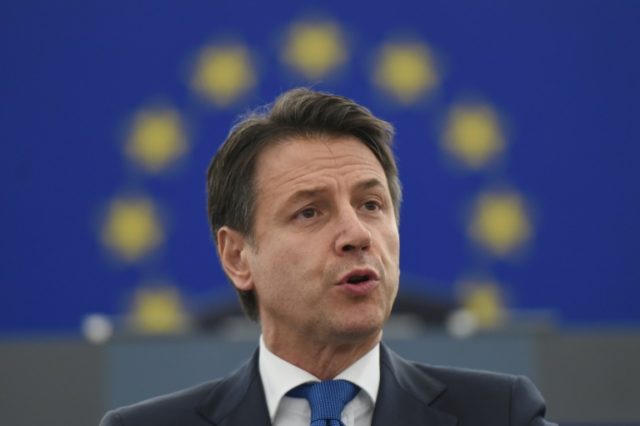Pressure is mounting against Italian Prime Minister Guiseppe Conte to refrain from signing aboard China’s Belt and Road infrastructure project next week when Chinese President Xi Jinping visits Italy. Beyond the political ramifications of Italy aligning itself with China, and perhaps finding itself on the business end of Chinese debt colonialism, analysts warn Conte has not fully considered the financial aspects of the arrangement.
Reuters published a summary of the Memorandum of Understanding (MOU) Conte plans to sign when Xi arrives in Rome, finding it “full of broad undertakings” but “short on specific details.”
The draft version seen by Reuters discusses cooperation on transportation projects, investment in developing countries, and collaboration between financial institutions.
More specifics could be provided when Xi visits Italy, as the Italian government hinted at least 50 individual deals could be signed with the Chinese president, covering everything from trade goods to oil and gas.
Reuters followed up the MOU outline with an article quoting deep misgivings from critics across Europe and the United States, beginning with anxiety about the lack of diplomatic experience among Conte and his “China Task Force,” a group that shouldered aside the Italian foreign service and sent a plain signal to China that Conte was eager to make a deal.
Italy’s superficially understandable appetite for Chinese investment and commerce was measured by Reuters against the rest of Europe’s growing disillusionment with Chinese partnerships:
Earlier this week, the European Commission branded Beijing a “systemic rival” and called on European Union leaders to back its ideas to curb Chinese state-owned enterprises.
The European Union has grown increasingly frustrated by what it sees as the slowness of China to open its economy and by a surge of Chinese takeovers in critical EU sectors, accusing it of distorting local markets.
Rome says such concerns should not stop it forging closer ties and points to the fact that 13 EU countries have already signed memoranda of understanding (MOUs) with China, including Hungary, Poland, Greece and Portugal.
However, the biggest EU exporters to China have not signed MOUs and those that have do not have much to show for it, said Lucrezia Poggetti, a research associate with the Mercator Institute for China Studies in Berlin.
“They have been frustrated that vaguely phrased Chinese promises for economic opportunities have largely failed to materialize,” Poggetti told Reuters.
“Signing up to the BRI without taking into account geopolitical considerations and without making concrete demands, hoping that one day you will get something in return economically, is very naive,” she said.
The United States is worried about China increasing its influence – and financial leverage – over Europe and potentially compromising its security by using Italy as a gateway. As a White House national security official put it, there is “no need for the Italian government to lend legitimacy to China’s infrastructure vanity project.”
The Trump administration has invested considerable effort in warning developing nations about the pitfalls of joining Belt and Road and developing an alternative infrastructure program with U.S. allies. Much of this work could be undone if a G7 nation like Italy lends prestige to Belt and Road.
U.S. Senator Marco Rubio (R-FL) told Breitbart News last week that Italy would be “stunningly naive” to “curry favor with the Communist Chinese government” by joining Belt and Road.
“As we in the U.S. are learning, the long-term economic and national security risks far outweigh any increases in Chinese foreign investment or increased exports to China,” Rubio warned the Italians.
Similar concerns were expressed by Interior Minister and Deputy Prime Minister Matteo Salvini, who quarterbacks the right-wing populist side of the tumultuous Italian political playing field.
“If it’s about helping Italian companies invest abroad, we’re ready to talk to anyone,” Salvini said of Belt and Road earlier this week. “But we’re absolutely not ready to do so if it’s a question of foreign companies colonizing Italy.”
Salvini referred to U.S. warnings about information security vulnerabilities that could be introduced by purchasing Chinese technology. Italian intelligence officials say they do not share America’s concerns about the security of products from Chinese companies like Huawei.
Fortune suggested on Thursday that Salvini and like-minded members of his coalition could play bad-cop to Conte when President Xi visits, pushing the Chinese to give Italy a better deal. They might be able to push Xi for more concessions by pointing out that if Belt and Road fails to absorb Italy after all the buildup and controversy, its chances in the rest of European Union are not good.
An alternative possibility is that Italy is taunting Europe with its brash embrace of Belt and Road and hoping for bids from the EU and United States to keep Rome from getting too cozy with Beijing. The Italians sent signals last week that neither public criticism nor behind-the-scenes pressure will keep them from signing an attractive deal with China.
A third theory is that Italy expressed interest in Belt and Road to flatter China into extending more limited business offers, but the fractious Italian political elite was caught by surprise when China called its bluff. The truth should become plain enough next week when Xi arrives and all cards are finally laid on the table.

COMMENTS
Please let us know if you're having issues with commenting.